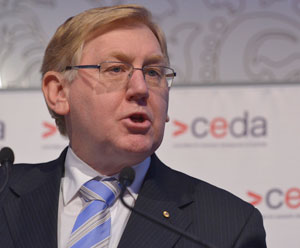
Launching the Federal Government's Energy White Paper, Minister for Resources, Energy and Tourism, Martin Ferguson told a CEDA audience in Melbourne that Australian governments at all levels must embrace key energy reforms to improve regulatory efficiency, stimulate market competition and minimise price pressures.
The Energy White Paper titled, Australia's Energy Transformation, is a long term strategic policy document, and provides continued commitment to market based solutions, he said.
Mr Ferguson said the Energy White Paper seeks to change the way Australia makes national energy policy.
Locking in four-yearly strategic reviews of energy policy, from 2016 onwards - backed by two-yearly security and technology assessments - provides a predictable and robust framework for ongoing policy development and informed debate in Australia, he said.
He said the paper provides a vision for Australia's energy future to:
- Develop a national approach to our energy markets;
- Create an Australia that is the number one investment destination for resource development;
- Develop Australia's natural gas reserves to become one of the world's largest LNG exporters, while effectively servicing the domestic market; and
- Create an Australia that transitions to cleaner forms of energy over time in a way that doesn't impede economic competiveness.
Mr Ferguson said the paper sets out four priority action areas including:
- Delivering better energy market outcomes for consumers;
- Accelerating clean energy transformation;
- Developing critical energy resources, particularly natural gas; and
- Strengthening the resilience of our energy policy framework.
He said the success of securing a clean and productive energy future will depend on how we overcome some key challenges including:
- Minimising energy price pressures and growth in peak demand;
- Tightening in our east coast gas market;
- Ensuring our liquid fuel security;
- Transitioning to clean energy;
- Retaining our competitive energy resource development; and
- Informing a constructive energy debate.
On minimising future pressures, he said we need to ensure markets, regulatory frameworks and their institutions operate in the long term interests of consumers.
He said retail price deregulation is one area of critical reform needed to improve competition and deliver innovative solutions to consumers.
"Consumers must be given the right signals through flexible time-of-use pricing to make decisions about their energy use," he said.
"If we are to provide consumers with more choice then we also need to promote better information through tools, like smart meters to assist consumer decisions.
"The willingness of other state governments to take on these hard reforms is essential."
Another major challenge the Energy White Paper identifies is the changing dynamic of domestic gas markets.
The transitional pressures on the east coast of Australia are creating price pressures and tightening supply conditions, he said.
"This is best achieved by open and efficient markets, where price is allowed to balance the market and provide incentives for developing new supply," he said.
To combat economic pressure from the Asian mega-refineries and support ongoing liquid fuel security, he said importing fuel from well-established international supply chains and ready access to regional fuel supplies will be introduced.
On clean energy, Mr Ferguson told attendees that to meet emission reduction targets, clean energy requires development in a diverse range of new cleaner technologies and processes.
"While fossil fuels will underpin our energy security for many years to come, clean energy generation could grow to provide over 40 per cent of our electricity needs by 2035 and potentially up to 85 per cent by 2050," he said.
"If this clean energy transformation was to be realised it will require more than $200 billion in new generation investment between now and 2050."
He said the principal policy aim for clean energy is to meet Australia's greenhouse gas emissions targets at the least cost while maintaining energy security.
"To deliver on this, the Government has established key reforms like carbon pricing, the Renewable Energy Target and a further $17 billion in funding for technology development and commercialisation to drive the transformation," he said.
In regard to retaining competitive energy resource development, Mr Ferguson warned the prospects for establishing new projects are becoming more challenging due to declining commodity prices, the emergence of new suppliers, rising production costs and more intense competition for the investment dollar.
"We must work harder than ever to lock-in robust investment across the energy supply chain," he said.
"Realising the potential of our energy future will require significant levels of investment in domestic infrastructure and further development of our resource base. Almost all of it will come through private domestic and international financial markets."
Lastly, he outlined that Australia must have a mature, candid and on-going public debate about our energy future.
"The energy industry - both upstream and downstream - needs to step up its engagement with the community, because without their support your business will face increasing challenges," he said.
In an energy economy such as Australia, it must have a routine analytical process, so that governments and industry are forced to regularly review actual outcomes, changed circumstances and challenge their assumptions, he said.
CEDA, Chief Executive, Stephen Martin comments to ABC TV on privatisation, following the release of the paper, said he supports this and believes the idea of an open market should be taken further, and power generators and transmitters should be privatised.
"Why should state governments be in that? Leave it to people who know what they're doing, leave it to players in the market who can then offer competitive pricing regimes," he said.